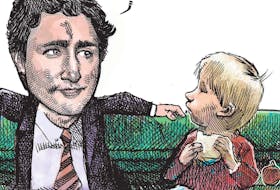In this line of work, you learn who to trust and who not to trust, and that it is vital to put yourself in the latter category.
Don’t trust what you know, because you don’t know enough. Don’t trust what you think you heard because what you think may not be what you heard. And, for sure don’t trust your memory, because its fallible data processor will spit out subconscious absurdity and convince you it’s timeless truth.
Take last week, for instance. In trying to make a case that the collaborative model for primary care in Nova Scotians may exacerbate two of the biggest problems with health services, namely access and cost, I trusted too much. The case can still be made, but it’s more nuanced.
There is evidence from other jurisdictions and from academic studies that the cost per patient – a measure some health professionals detest for reasons to follow – is significantly higher when collaborative teams provide primary care than when it’s done by family practice docs.
In the never-ending quest for economy of words – undetectable thus far – the habits of salaried doctors were generalized to the point of distortion. Likewise, nurse practitioners and the doctors that work with them report positive results that differ from information previously received and passed along.
Nurse practitioners in Nova Scotian collaborative teams require the team’s physicians to intervene in about 10 per cent of cases, if that, according to one physician. This is obviously exponentially better than a 50 per cent physician intervention rate cited anecdotally by other sources.
It is premature to drawn conclusions about the relative productivity of salaried doctors in Nova Scotia versus fee-for-service docs. Firstly, salaried family physicians – there are about 150 of them among Nova Scotia’s 1,100 family physicians – report they far exceed the 37.5 hour-work-week stipulated in their contracts.
And, while they concede they do not see as many patients per day as their fee-for-service colleagues, they question the value of the measure. They will spend more time with a patient, and deal with multiple complaints, while the fee-for-service billing system encourages separate appointments for each complaint.
Understanding the changes underway in primary care, the problems they are intended to resolve as well as those they create, is the journalistic equivalent of reading chicken entrails – that’s called haruspicy – to predict the prospects of anything other than the chicken.
The health bureaucracies dole out information like a parsimonious publican pours 40-year-old single malt.
The Health Department, and especially the Nova Scotia Health Authority, communicate using promotional techniques that would make P.T. Barnum blush, and they aren’t nearly as good at it as was the legendary huckster. Straight forward questions earn platitudinal responses choked by bureaucratic jargon devoid of meaning or value.
It is a politically-motivated communications style which goes beyond insulting to be contemptuous of its audience, and that’s more galling given the audience pays the salaries of NSHA mandarins. It requires 18 pages, by the way, just to list the six-figure-wage earners among NSHA functionaries.
The authority’s propensity to select spin over authenticity isn’t restricted to so-called media management. Senior officials polish the outfit’s dull lustre in settings where they have a higher obligation to be honestly accountable.
Appearing before the legislature’s public accounts committee last month, the authority’s senior medical director Rick Gibson told MLAs the authority now has what it needs to plan for future family doctor requirements across the province. “Now we’re in a much better position because they are credentialed,” he said.
But even as he was speaking, the NSHA was issuing a tender “for a more robust data system to better track and report on physician information, including credentialing, privileging and recruitment.”
No mention was made of the tender at the committee, and members could be excused for coming away with a sense that at least the NSHA is working from good information, when it is in fact just going about the process of buying better data.
Gibson may have neglected to provide a complete picture in the interest of economy, although he did consume considerable time describing how things used to be, to “highlight the importance of having a single Health Authority and the work that we’re doing.”
Say what you will about the health authority – and I have – they very good a teaching us who to trust.
VIBERT: Haruspicy isn’t revealing the fate of health care
STORY CONTINUES BELOW THESE SALTWIRE VIDEOS
Boy dies in homicide at Halifax Shopping Centre parkade | SaltWire #halifax #police #news








